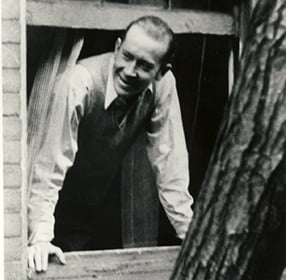Chansons Innocentes II
hist whist
little ghostthings
tip-toe
twinkle-toe
little twitchy
witches and tingling
goblins
hob-a-nob hob-a-nob
little hoppy happy
toad in tweeds
tweeds
little itchy mousies
with scuttling
eyes rustle and run and
hidehidehide
whisk
whisk look out for the old woman
with the wart on her nose
what she’ll do to yer
nobody knows
for she knows the devil ooch
the devil ouch
the devil
ach the great
green
dancing
devil
devil
devil
devil
wheeEEE
This poem is in the public domain. Published in Poem-a-Day on October 29, 2023, by the Academy of American Poets.
“Chansons Innocentes II” appears in E. E. Cummings’s first collection, Tulips and Chimneys (Thomas Seltzer, 1923). The poem is the second in a suite of four poems titled “Chansons Innocentes,” or “innocent songs,” in English. In “When Syntax Leads a Rondo with a Paintbrush: The Aesthetics of E. E. Cummings’s ‘in Just-’ Revisited,” published in Spring: The Journal of the E. E. Cummings Society, no. 18 (October, 2011), R. A. Buck, professor of English at Eastern Illinois University, writes that the poem “celebrates country folk superstitions of All Hallow’s Eve or All Soul’s Day, when ‘witches and tingling / goblins,’ ‘little ghostthings,’ and other spirits of the dead make their appearance. The poem is written as a child feels in the midst of these ideas, stories, and legends of old age, death, and the supernatural; much of the diction is in child language. [. . .] [L]little creatures from another world are ‘scuttling,’ running, and hiding, creatures that are strange and fearful to a child, yet also described as childlike in character. [. . .] Cummings never lets us feel too sad about death. The suggestion is that we should do as children do: feel old age and death in our midst for only a brief moment, and then go back to playing. Cummings reaffirms the joy of life that is always in process, and even imagines the spirits of the dead continuing this fun, the way a child might imagine it, for, after all, it is a green, innocent devil that is depicted dancing.”

